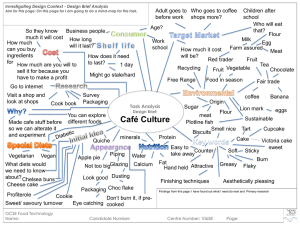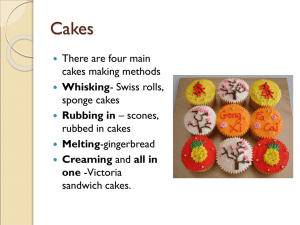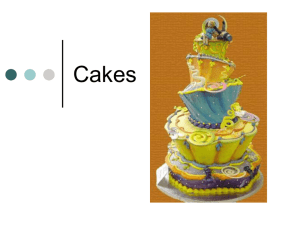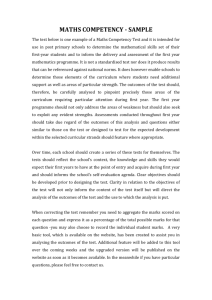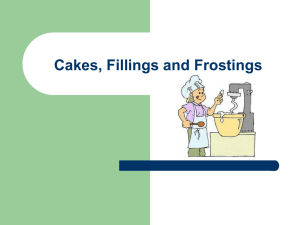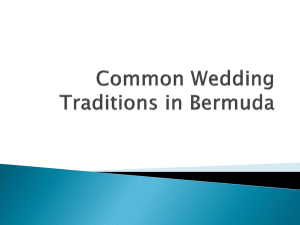Cakes Powerpoint - As a matter o` FACt!
advertisement
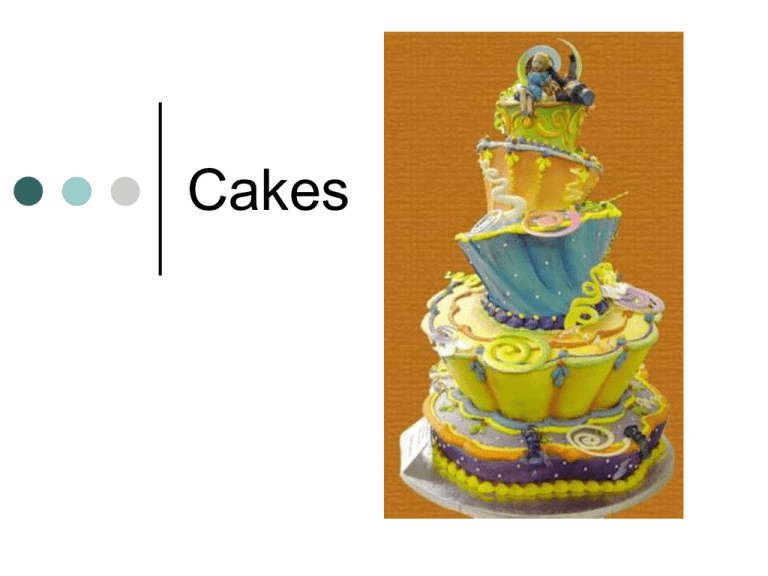
Cakes 2 classes of cakes Shortened Cakes: Also called “butter cakes” Contain fat • Solid fat: butter, margarine or vegetable shortening. • Liquid fat: oil Leavened by chemical agents Unshortened Cakes: Also called “foam cakes” Contain NO fat Leavened by steam and air Cake continued. Shortened Texture: tender, moist and velvety. Eggs: use whole egg Example: cake Unshortened Texture: light and fluffy Eggs: only use egg whites Example: angel food cake Chiffon Cakes Cross between shortened and unshortened cakes Contain fat (shortened) Use beaten egg whites (unshortened) Large volume but not as light as unshortened. Mixing Methods: Conventional Method 1. Cream sugar with fat 2. Beat in eggs 3. Add dry ingredients alternately with liquid 4. Beat 2 min. Mixing Methods: Quick Method 1. Sift dry ingredients 2. Add ½ of the milk & all of the shortening. 3. Beat 2 min. (300 strokes w/spoon) 4. Add the rest of the liquids & eggs 5. Beat 2 min. more Cake Ingredients Flour: –Creates the structure of the cake –Cake flour •Contains less gluten •More velvety •Delicate –All-purpose flour •Contains more gluten •Remove 2 Tbsp. per cup of flour –Sift the flour Sugar: Functions: • Flavor • Improves texture • Helps brown the cake Brown or white (granulated) sugar Use the one the recipe calls for Eggs: Improve color and texture Make the cake light and fluffy Liquid: • Provides moisture • Helps blend ingredients • Examples: – Milk – Buttermilk – Juice – Pop Salt: Provides flavoring. Fat: Tenderizes the gluten. Shortened cakes contain butter, margarine or vegetable shortening. Chiffon contain oil. Leavening: Causes cake to rise Cake becomes porous (holes in it) Examples: • Baking Powder, Baking Soda and Air Flavoring: Add flavor. Example: spices, extracts, nuts, fruits. Baking cakes Follow directions for: Specific pans Oven temperature Baking time Pan size Too largecake will not brown Too smallbatter will overflow Pan type Aluminum Pans give the cake a light, dull finish Dark, Coated Pans give the cake a dark, heavy crust Baking Cakes Preparing Pans Prepare as directed • Grease & lightly dust with flour • Shake out extra • Or line with waxed paper cut to size Do not grease sides of pan Fill pans half full
